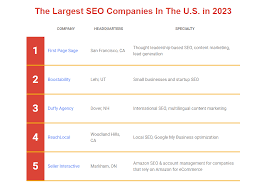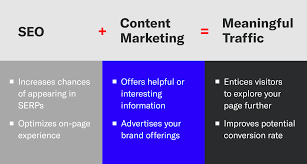The Power of SEO and SEM in Digital Marketing
Search Engine Optimization (SEO) and Search Engine Marketing (SEM) are two crucial pillars of digital marketing that play a significant role in enhancing online visibility, driving traffic, and boosting conversions for businesses of all sizes. While both strategies focus on improving a website’s performance in search engine results pages (SERPs), they differ in their approaches and objectives.
SEO: Enhancing Organic Visibility
SEO is the practice of optimizing a website’s content, structure, and technical elements to improve its organic (unpaid) search engine rankings. By adhering to best practices and following search engine algorithms, businesses can increase their visibility for relevant keywords and attract more organic traffic.
Key components of SEO include keyword research, on-page optimization, link building, and technical SEO. By creating high-quality content that resonates with users and search engines alike, businesses can establish authority in their industry and drive sustainable long-term results.
SEM: Driving Targeted Traffic with Paid Advertising
SEM involves using paid advertising campaigns to promote websites on search engines. Unlike SEO, which focuses on organic results, SEM allows businesses to bid on keywords to display ads prominently in search results. Popular SEM platforms include Google Ads (formerly AdWords) and Bing Ads.
SEM offers immediate visibility and control over ad placements, targeting options, and budget allocation. By crafting compelling ad copy, selecting relevant keywords, and optimizing landing pages for conversions, businesses can drive targeted traffic to their websites and achieve specific marketing objectives.
The Synergy Between SEO and SEM
While SEO and SEM are distinct strategies, they can complement each other effectively when integrated into a cohesive digital marketing plan. By leveraging the strengths of both approaches, businesses can maximise their online presence, reach a wider audience, and improve overall performance.
SEO lays the foundation for long-term success by building organic visibility and credibility over time. On the other hand, SEM provides immediate results through paid advertising campaigns that target specific audiences based on demographics, interests, or intent.
In Conclusion
In today’s competitive digital landscape, incorporating both SEO and SEM into your marketing strategy is essential for achieving sustainable growth and staying ahead of the competition. By understanding the unique benefits of each approach and utilising them strategically, businesses can enhance their online presence, drive quality traffic, and ultimately increase conversions.
9 Essential Tips for Mastering SEO and SEM in Digital Marketing
- SEO
- SEO
- SEO
- SEM
- Use targeted keywords in your PPC campaigns to reach the right audience.
- SEM
- SEM
- Create compelling ad copies that entice users to click and convert.
- SEO
SEO
Search Engine Optimization (SEO) is a fundamental aspect of digital marketing that focuses on enhancing a website’s organic visibility in search engine results. By implementing SEO best practices such as keyword research, on-page optimization, and link building, businesses can improve their search engine rankings and attract valuable organic traffic. SEO plays a crucial role in establishing credibility, authority, and relevance for a website, ultimately helping businesses connect with their target audience and drive sustainable long-term growth online.
SEO
Search Engine Optimization (SEO) is a fundamental aspect of digital marketing that focuses on enhancing a website’s organic visibility in search engine results. By implementing SEO best practices such as keyword research, on-page optimization, and link building, businesses can improve their search engine rankings and attract relevant traffic without relying on paid advertising. SEO is essential for establishing credibility, increasing brand awareness, and driving sustainable long-term results by delivering valuable content that resonates with both users and search engines.
SEO
Search Engine Optimization (SEO) is a fundamental aspect of digital marketing that focuses on enhancing a website’s organic visibility in search engine results. By implementing SEO best practices such as keyword research, on-page optimization, and link building, businesses can improve their search engine rankings and attract relevant organic traffic. SEO plays a crucial role in establishing a strong online presence, increasing brand credibility, and driving sustainable long-term results by ensuring that websites are easily discoverable by users searching for relevant information or products.
SEM
Search Engine Marketing (SEM) is a powerful digital marketing strategy that involves using paid advertising to promote websites on search engines. By strategically bidding on keywords and crafting compelling ad copy, businesses can achieve immediate visibility in search engine results pages (SERPs). SEM provides businesses with control over their ad placements, targeting options, and budget allocation, allowing them to reach specific audiences and drive targeted traffic to their websites. With SEM, businesses can effectively enhance their online presence, attract potential customers, and achieve their marketing objectives efficiently.
Use targeted keywords in your PPC campaigns to reach the right audience.
To maximise the effectiveness of your PPC campaigns in digital marketing, it is essential to incorporate targeted keywords that resonate with your specific audience. By selecting relevant keywords that align with user intent and search queries, you can ensure that your ads are displayed to the right audience at the right time. This strategic approach not only enhances the visibility of your ads but also increases the likelihood of attracting qualified leads and driving conversions. Incorporating targeted keywords in your PPC campaigns is a powerful way to optimise your SEM efforts and reach a receptive audience primed for engagement.
SEM
Search Engine Marketing (SEM) is a powerful digital marketing strategy that involves using paid advertising to promote websites on search engines. By strategically bidding on relevant keywords and crafting compelling ad copy, businesses can achieve immediate visibility in search engine results pages (SERPs). SEM provides businesses with the flexibility to target specific audiences, set budgets, and measure campaign performance effectively. This dynamic approach to online advertising enables businesses to drive targeted traffic to their websites, increase brand awareness, and achieve specific marketing goals efficiently.
SEM
Search Engine Marketing (SEM) is a powerful digital marketing strategy that involves leveraging paid advertising to enhance a website’s visibility on search engine results pages. By running targeted ad campaigns on platforms like Google Ads and Bing Ads, businesses can reach their desired audience effectively and drive immediate traffic to their websites. SEM allows for precise targeting, budget control, and real-time performance tracking, making it a valuable tool for achieving specific marketing goals such as increasing brand awareness, generating leads, or driving sales. When executed strategically, SEM can deliver quick results and complement the long-term benefits of SEO to maximise a website’s online presence and overall performance.
Create compelling ad copies that entice users to click and convert.
Creating compelling ad copies is a crucial aspect of both SEO and SEM in digital marketing. Effective ad copies have the power to captivate users, pique their interest, and ultimately drive them to click through and convert. By crafting engaging and persuasive messaging that resonates with the target audience’s needs and desires, businesses can increase click-through rates, improve ad relevance, and boost overall campaign performance. A well-written ad copy not only entices users to take action but also sets the stage for a positive user experience that can lead to conversions and long-term customer relationships.
SEO
Search Engine Optimization (SEO) is a fundamental aspect of digital marketing that focuses on enhancing a website’s organic visibility in search engine results. By implementing SEO best practices such as keyword research, on-page optimization, and link building, businesses can improve their search engine rankings and attract relevant organic traffic. SEO plays a crucial role in establishing a strong online presence, increasing brand visibility, and driving long-term sustainable results for businesses looking to expand their reach and engage with their target audience effectively.




